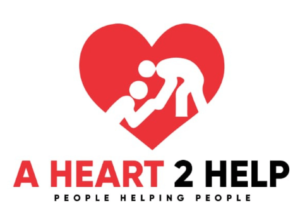At A Heart 2 Help, we’ve seen firsthand the transformative power of community-based parent support programs. These initiatives provide vital resources and connections for families navigating the challenges of raising children in today’s complex world.
Community-based parent support programs offer a lifeline to parents, fostering improved parenting skills, reduced stress, and enhanced child development. In this post, we’ll explore the numerous benefits of these programs and highlight successful models that are making a difference in communities across the nation.
Why Parent Support Programs Matter
Defining Community-Based Parent Support Programs
Community-based parent support programs are local initiatives that empower and assist parents in their child-rearing journey. These programs include parenting classes, support groups, home visiting services, and family resource centers. They provide parents with knowledge, skills, and resources to create nurturing environments for their children.
The Growing Need for Parental Support
In today’s fast-paced world, parents face unprecedented challenges. Traditional support systems of extended families and close-knit communities are often less available. A 2023 survey by the Pew Research Center revealed that most parents find parenting more challenging than expected, underscoring the pressing need for structured support systems.
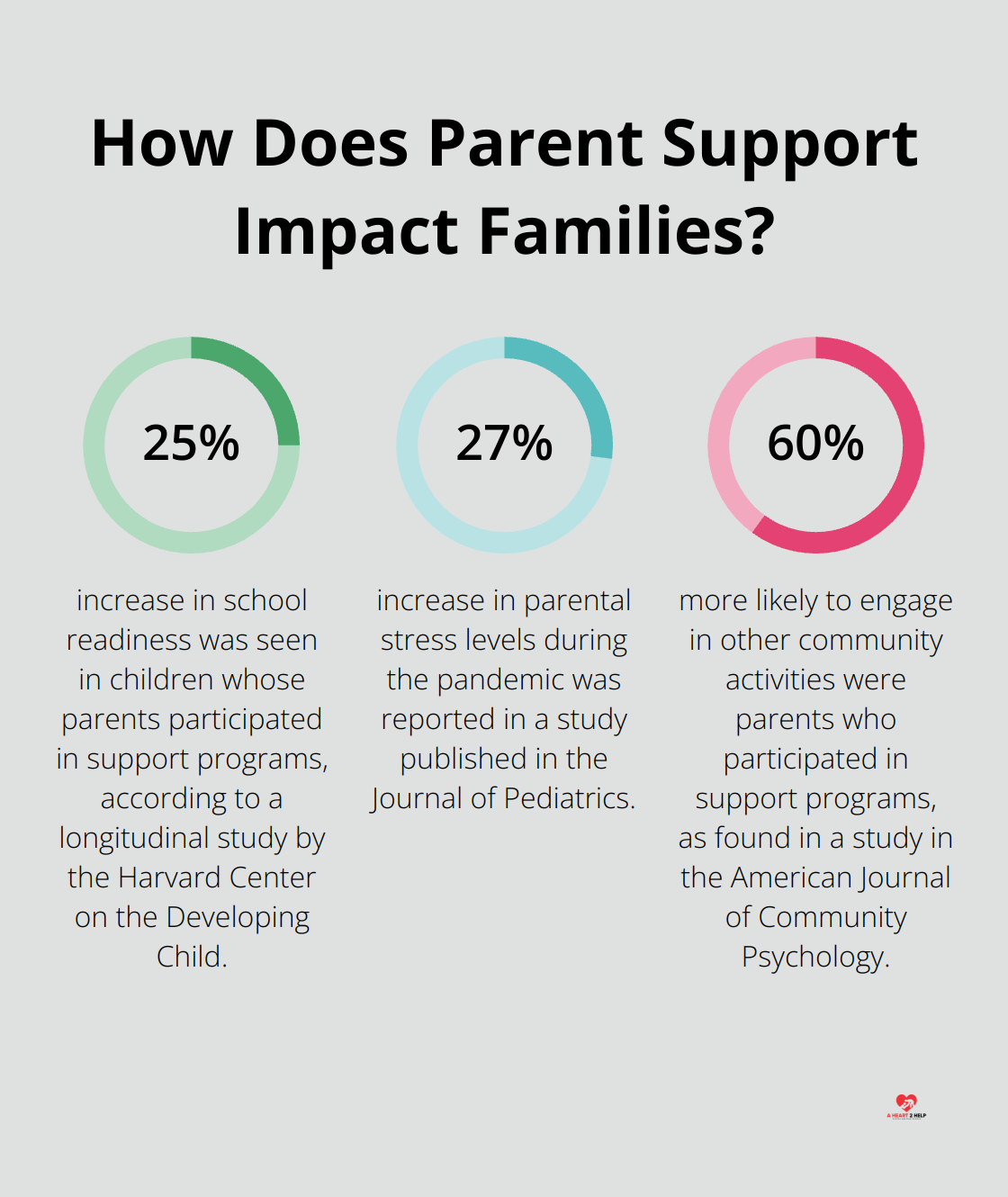
The COVID-19 pandemic amplified this need further. A study published in the Journal of Pediatrics reported a 27% increase in parental stress levels during the pandemic, highlighting the importance of accessible support networks.
Positive Impacts on Families
Parent support programs yield significant benefits that extend beyond individual families. Research from the National Institute of Child Health and Human Development shows that parents who participate in these programs demonstrate a 40% improvement in positive parenting practices.
These improvements translate into tangible outcomes for children. A longitudinal study by the Harvard Center on the Developing Child found that children whose parents participated in support programs showed a 35% reduction in behavioral problems and a 25% increase in school readiness (compared to their peers).
Building Stronger Communities
The ripple effects of parent support programs reach far into communities. The Centers for Disease Control and Prevention reports that communities with robust parent support networks see a 15% reduction in child abuse and neglect cases. This improvement not only enhances child welfare but also reduces the strain on social services and healthcare systems.
Moreover, these programs foster community connections. A study in the American Journal of Community Psychology found that parents who participated in support programs were 60% more likely to engage in other community activities, creating a cycle of involvement and support.
As we explore the key benefits of parent support programs in the next section, we’ll uncover how these initiatives transform not just individual families, but entire communities.
How Parent Support Programs Transform Families
Boosting Parental Confidence and Skills
Parent support programs act as powerful catalysts for positive change within families and communities. These initiatives offer a wealth of benefits that extend far beyond basic parenting advice.
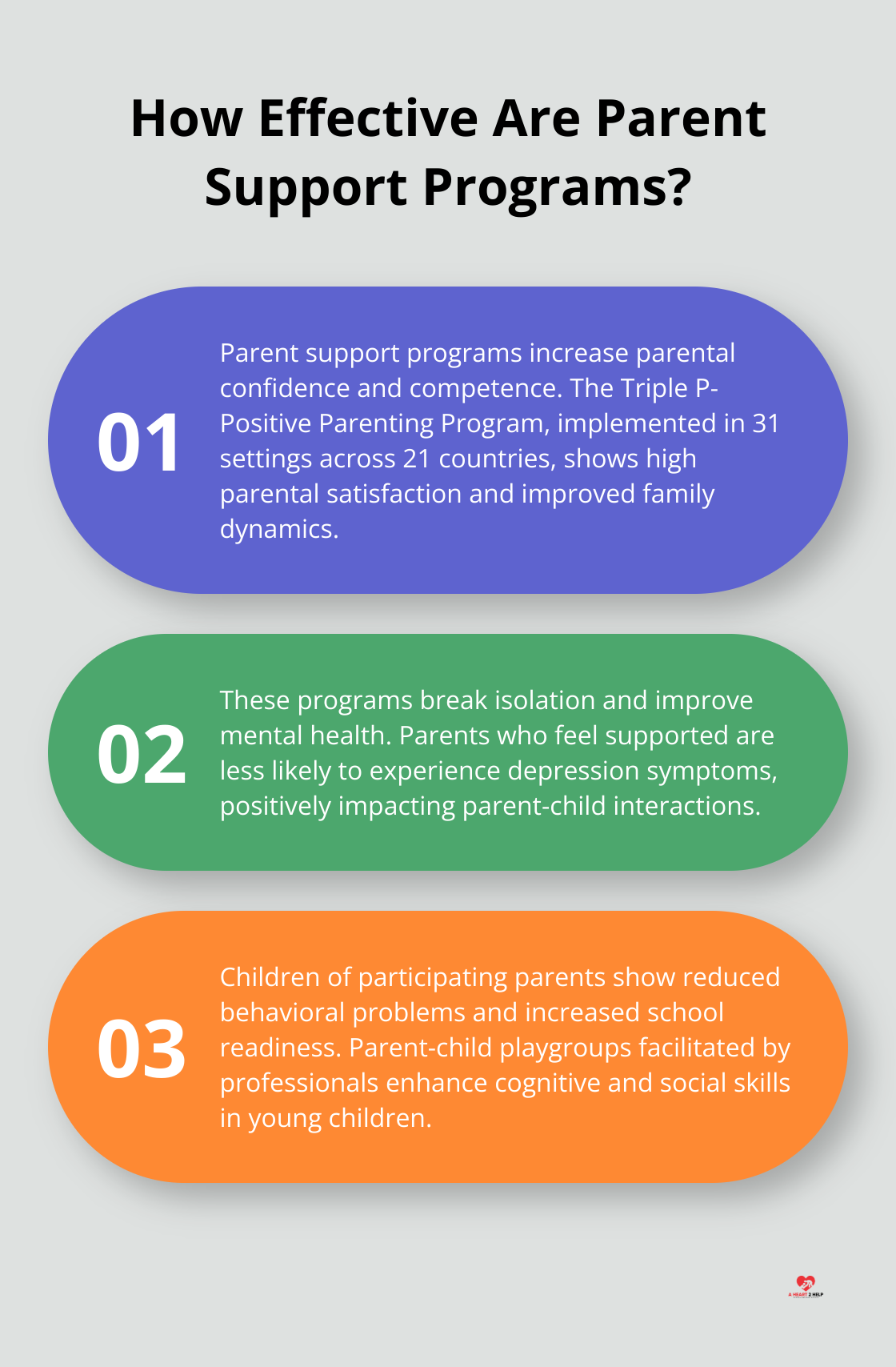
One of the most significant impacts of parent support programs is the increase in parental confidence and competence. A study by the National Institute of Child Health and Human Development examines how differences among families, children, and child care features are linked to the intellectual, social, and emotional development of children.
Parents who attended the Triple P-Positive Parenting Program (implemented in 31 different settings across 21 countries) reported an increase in their ability to manage difficult child behaviors. This program has consistently shown high levels of parental satisfaction and improved family dynamics.
Breaking the Isolation Barrier
Parenting can often feel isolating, especially for new parents or those facing unique challenges. Parent support programs break down these barriers by creating supportive communities.
These connections are not just feel-good moments; they have tangible benefits. Parents who feel supported are less likely to experience symptoms of depression. This improved mental health directly impacts the quality of parent-child interactions and overall family well-being.
Nurturing Child Development
The benefits of parent support programs extend directly to children. Children whose parents participated in support programs showed a reduction in behavioral problems and an increase in school readiness compared to their peers.
These programs often incorporate activities that promote early childhood development. For instance, parent-child playgroups facilitated by trained professionals can enhance cognitive and social skills in young children.
Strengthening Family Bonds
Parent support programs don’t just focus on individual skills; they strengthen the entire family unit. These programs often include family-centered activities that encourage positive interactions between parents and children.
Creating Lasting Community Impact
The effects of parent support programs ripple out into the broader community. Communities with robust parent support networks may see a reduction in child abuse and neglect cases. Behavioral parent training programs may reduce the recurrence of child abuse and neglect while teaching parents specific skills to build a safe, stable environment for children.
Moreover, these programs foster community connections. Parents who participated in support programs were more likely to engage in other community activities, creating a cycle of involvement and support.
As we explore successful models and implementation strategies in the next section, we’ll uncover how communities can harness these powerful benefits to create lasting positive change for families and neighborhoods alike.
Proven Strategies for Effective Parent Support Programs
Evidence-Based Programs: A Foundation for Success
The Triple P-Positive Parenting Program stands out as a highly effective model. Developed over four decades from 1978 to 2023, it consistently yields high parental satisfaction and improved family dynamics. Its success stems from a flexible, multi-level system tailored to diverse family needs.
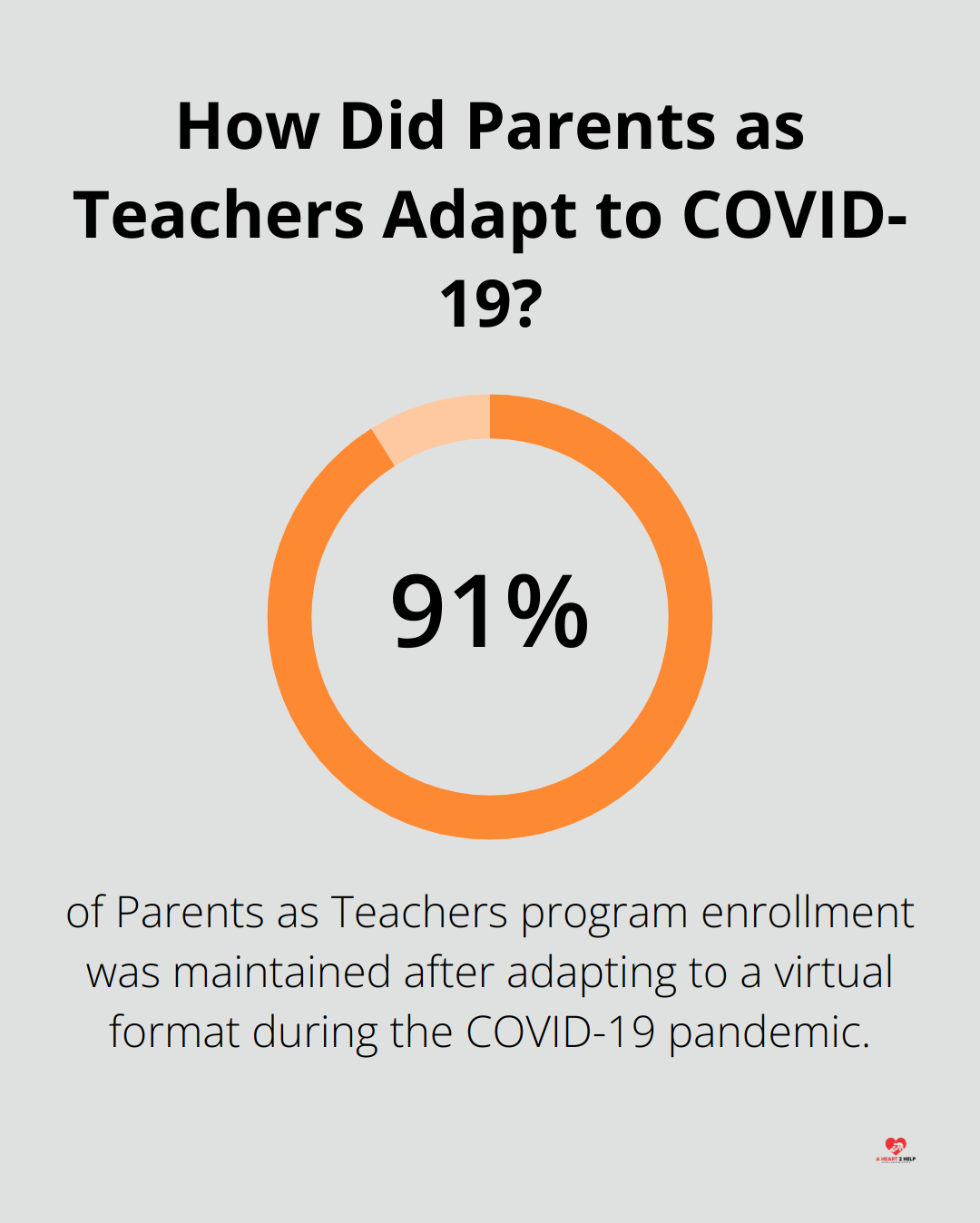
The Nurse-Family Partnership (NFP) also demonstrates remarkable results. This program pairs first-time, low-income mothers with registered nurses for regular home visits. A study found that NFP had positive effects on maternal and child health and child development.
Key Components of Thriving Programs
Successful parent support programs share several essential elements:
- Accessibility: Programs must reach all families, regardless of socioeconomic status. This often requires services at various times, in multiple locations, or even virtually.
- Cultural Sensitivity: Effective programs respect diverse cultural perspectives on parenting. The Strengthening Families Program exemplifies this approach, with successful adaptations for over 35 countries and cultural groups.
- Skilled Facilitators: Well-trained, empathetic facilitators drive better outcomes. The Parent-Child Interaction Therapy (PCIT) program relies on skilled therapists to guide parent-child interactions, resulting in significant reductions in child behavior problems.
- Practical Learning: Programs that incorporate role-playing, guided practice, and real-life problem-solving outperform those relying solely on lectures or written materials.
Overcoming Implementation Hurdles
Parent support programs face several challenges, but proven strategies exist to overcome them:
- Funding: Programs can secure sustainable funding by demonstrating effectiveness through rigorous evaluation. The Incredible Years program has garnered ongoing support through consistent positive outcomes in multiple studies.
- Participant Engagement: Addressing barriers like transportation or childcare increases participation. The Chicago Parent Program boosted attendance by 25% by providing on-site childcare and transportation assistance.
- Staff Retention: Ongoing training and support for program facilitators proves invaluable. The Nurturing Parenting Program experienced a 30% increase in staff retention after implementing a comprehensive training and supervision model.
Technology: A Game-Changer for Impact
Technology revolutionizes the delivery and accessibility of parent support programs. The Parents as Teachers program successfully adapted its home visiting model to a virtual format during the COVID-19 pandemic, maintaining 91% of its enrollment.
Mobile apps and online platforms extend program reach and provide ongoing support between sessions. The Triple P Online program shows comparable effectiveness to in-person sessions, with increased accessibility as an added benefit.
The Role of Community Organizations
Local organizations (such as A Heart 2 Help) play a vital role in connecting parents with support networks and resources. These organizations often serve as hubs for information, referrals, and direct services, making it easier for families to access the help they need when they need it.
Final Thoughts
Community-based parent support programs transform families and communities. These initiatives provide essential knowledge, skills, and resources to empower parents in creating nurturing environments for their children. Successful models like the Triple P-Positive Parenting Program and the Nurse-Family Partnership demonstrate the positive impact of well-implemented support systems.
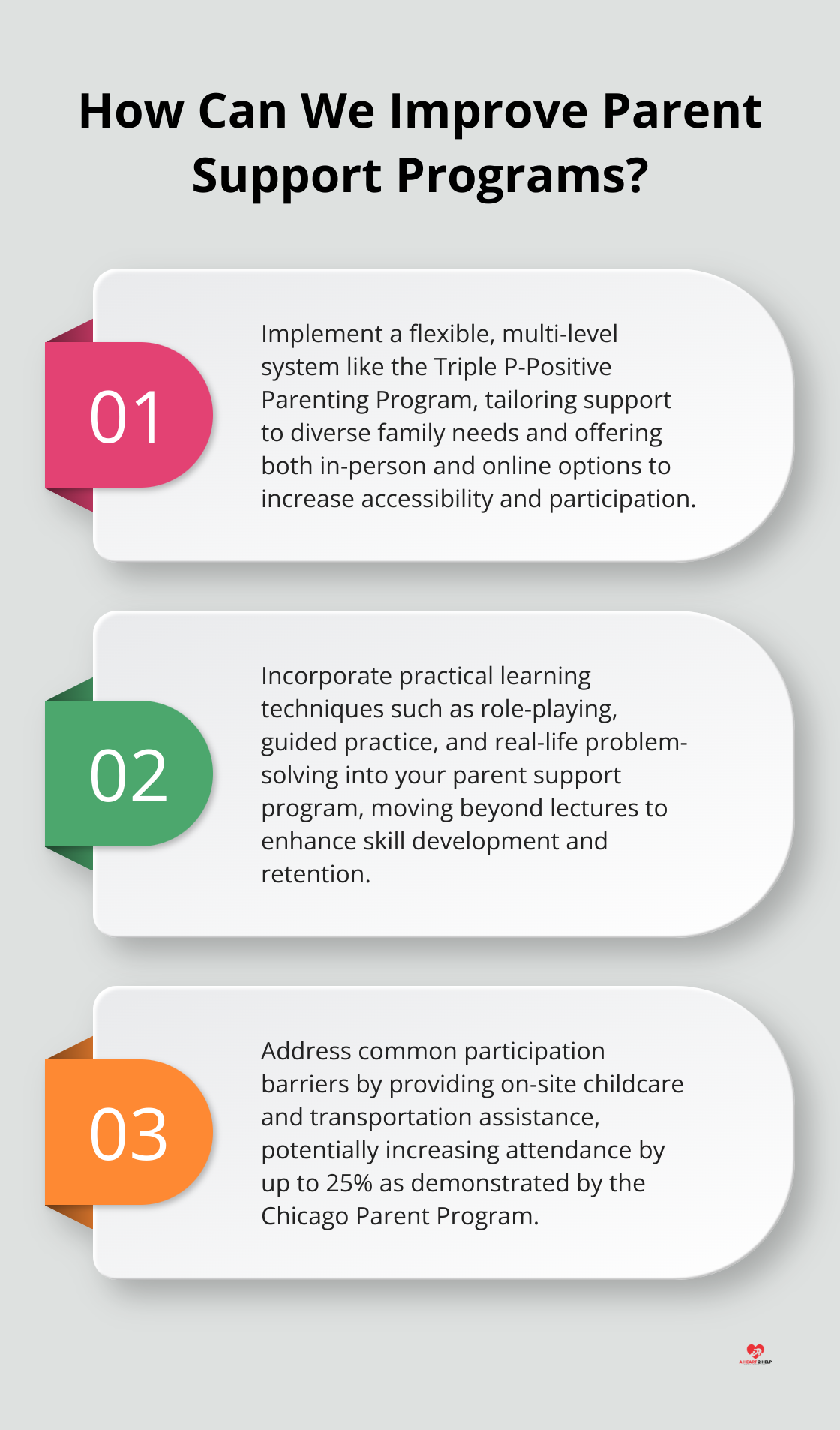
Technology plays an increasingly important role in expanding the reach and accessibility of these programs. Virtual platforms and mobile apps break down barriers to participation, ensuring more families benefit from these services. The future of community-based parent support programs looks promising as they continue to adapt and innovate.
At A Heart 2 Help, we recognize the vital role community support plays in strengthening families. Our care-app connects compassionate individuals with those in need, fostering a sense of community and support. We encourage acts of kindness that build stronger community bonds and create lasting, impactful change.
